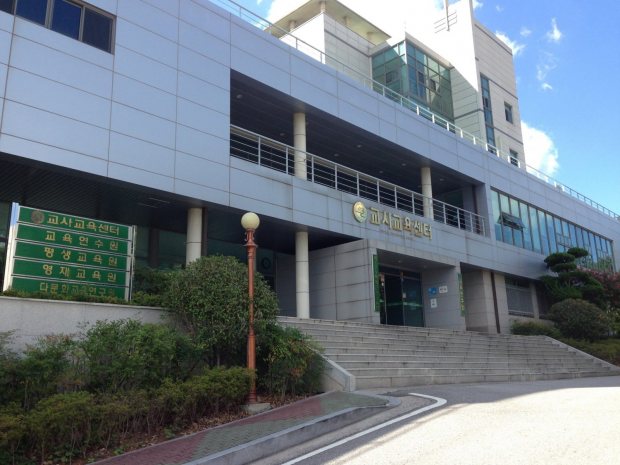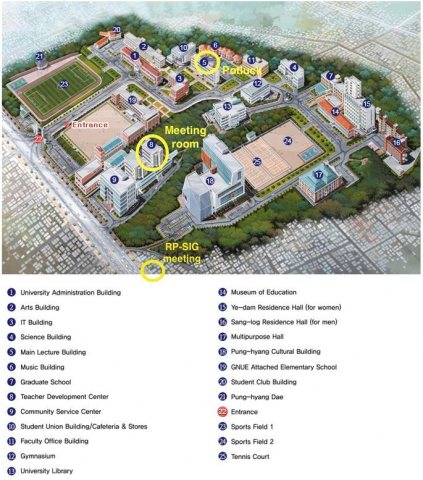
Gwangju-Jeonnam Chapter November Meeting
.
––– Morning Reflective Practice Session –––
Time: 11:00 am - 12:30 pm (2nd Sat., Nov. 11 (빼빼로날 11.11))
Location: Coffee Lab Mujii (formerly Aldersgate. NOT at Kenya Espresso Cafe), near GNUE. (Ground floor of 광주우리교회 Building. Map at bottom.)
ㅡ Topic: Teacher and Student Health and Well-Being
ㅡ Facilitator: Jocelyn Wright, Mokpo National University
––– MAIN MEETING SCHEDULE –––
Time: 2nd Saturday, November 11, 2017, 1:45 - 5:00 pm
Location: Gwangju National University of Education (GNUE), Teacher Training Center (교사교육센터) 1st Floor; Room 811. Detailed directions HERE.
1:45 pm: Sign-in and Meet-and-Greet (Admission: Free for newcomers. Membership welcomed.)
2:00 - 2:50 pm: Presentation 1
ㅡ Reflecting on Investment and English Language Teachers
ㅡ Jocelyn Wright (Mokpo National University)
2:50 - 3:00 pm: Chapter Elections
3:00 - 3:15 pm: Refreshment Break
3:15 - 4:05 pm: Presentation 2
ㅡ The Power of Routine
ㅡ Zon Petilla (Oejong English Center)
4:15 - 4:45 pm: Swap-Shop Presentations
Share your Teaching Ideas, Classroom Activities, and Teaching Wisdom with the group.
(Everyone is encouraged to share. Short tidbits are welcomed. Handouts also welcomed.)
4:45 - 5:00 pm: Announcements / Drawing for Door Prizes / Closing
––– After-meeting dinner at The First Alleyway, downtown –––
Presentation Summaries and Presenter Bio-sketches
.
Reflecting on Investment and English Language Teachers
Jocelyn Wright
According to numerous reports, South Koreans spend billions of dollars every year on English education, both public and private, as well as proficiency testing. Similarly, hours and hours of time are poured into the dual ventures of teaching and learning. This enormous expenditure is often either heralded or criticized, depending on who is discussing it.
In educational nomenclature, the term "investment" can also take on another meaning. In her seminal article, Bonny Norton (1995) coined it as follows: “the socially and historically constructed relationship of learners to the target language and their often ambivalent desire to learn and practice it” (p. 17). Her sociological construct originates from her interest in the interactions between learners’ multiple, complex, and changing identities, and the social world and her understanding that conditions shaped by capital, identity, and ideology afford or constrain learning.
Of course, we could also consider the socially and historically constructed relationship of teachers, both "native" and "nonnative," to the target language and their desire to study, use, and teach it. As teachers, we also have various, contradictory, and fluid identities. These have an impact upon our interactions with our learners and the environment.
Given that the quality of our investment is important to successful teaching and learning outcomes, we may ask ourselves: Are we fully invested in our teaching? Have we always been invested? To what extent are we invested? What evidence is there of our investment? Have we ever stopped investing fully? And so on and so forth.
In this workshop, focused on the English language teacher, we will discuss Bonny Norton’s construct and contrast it with motivation. The focus will then shift to reflecting on investment in relation to ourselves, our personal histories, and our desires in connection with our teaching contexts. We will next discuss states of investment, signs, and consequences, and ponder our investment trajectory. We will not neglect to consider the interplay with structural factors. The hope is that we will come to better understand what investment means and its implications on our day-to-day classroom practices.
Reference
Norton Peirce, B. (1995). Social identity, investment, and language learning. TESOL Quarterly, 29(1), 9-31. Retrieved from https://www.jstor.org/stable/3587803
The Presenter

Jocelyn Wright works in the Department of English Language and Literature at Mokpo National University. She has an honor’s degree in linguistics, a master’s degree in education in counseling and training, and is also CELTA certified. She has been teaching English in Korea at the university level for eight years, is actively involved in KOTESOL as the national coordinator of the Social Justice (Critical Educators in Korea) Special Interest Group (SIG) and as a facilitator of the local Reflective Practice SIG.
____________________
The Power of Routine
Zon Petilla
From waking up in the morning, putting on shoes, and going to school, students and teachers have a set of habitual routines. These routines consciously or subconsciously affect and effect how educators instruct as well as students’ perceptions and expectations of learning. English teachers in particular seek the best practices and many teacher training materials promote a general guide to the best way an educator can conduct a course or offer many activities to keep students' interest. However, it may help to understand the habits of students as an educator in order to encourage good habit formation to succeed and acquire the target language.
Using the The Power of Habit by Charles Duhigg (2012) as a primary text, this presentation aims to briefly explore 70 years of habit research as it relates to forming and changing student and teacher routines through strategies such as identifying a habit loop, keystone habits, habit replacement, and why the power of belief is critical for student and teacher success.
The session will include audience participation in the form of discussion of their individually identified routines in the classroom.
Reference
Duhigg, C. (2012). The Power Of Habit: Why We Do What We Do in Life and Business. New York, NY: Random House.
The Presenter

Zon Petilla is a public English Center teacher. For ten years, he has taught adults, teens, and adolescents. He has a master’s degree in business and a BA in linguistics with TESOL certification. He’s presented at the San Diego Comic-Con and the Korea TESOL National Conference. He is currently exploring how elements of game design and player psychology mirror student behavior and success.
____________________
Photo: The Gwangju National University of Education (GNUE / 광주교육대학교), Teacher Training Center (교사교육센터), venue for our main meeting - 1st floor, Room 811.




